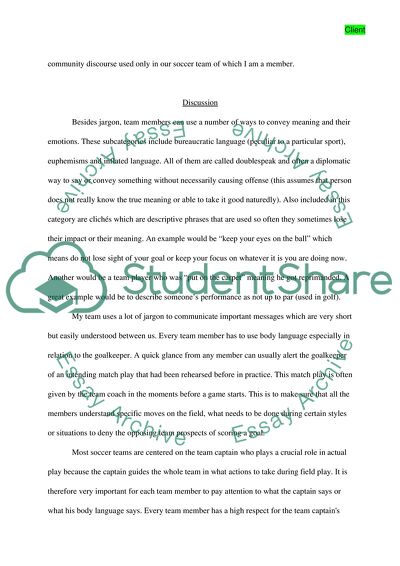
- Home
- Free Samples
- Premium Essays
- Editing Services
- Extra Tools
- Essay Writing Help
- About Us
- Studentshare
- Subjects
- Miscellaneous
- Discourse Community Analysis
Discourse Community Analysis - Essay Example

- Subject: Miscellaneous
- Type: Essay
- Level: Ph.D.
- Pages: 4 (1000 words)
- Downloads: 0
- Author: aiden34
Extract of sample "Discourse Community Analysis"
ings because using the correct jargon indicates insider knowledge of that group, either as member or as someone who has intimate knowledge not otherwise available to the general public. Local lingo is used in several professions like the medical, legal or professional sports groups. An example would be the word “love” which if used in tennis, means zero or zilch or nada. In other words, a score of love actually means the particular player is still scoreless against the opponent. There are other examples of jargon used in particular groups like in the military service, diplomatic corps, the government bureaucracy, arts and in technology.
In this paper, I will delve on the jargon or lingo used in professional sports teams. Its use is sometimes encouraged among the teams to enhance unity and cohesion, to instill a sense of belonging to the group. It can be used to improve individual and team performance, to inspire an athlete to do better or it can be used negatively, such as to castigate an erring team member or to encourage a change in behavior. In my case, I will discuss in particular the community discourse used only in our soccer team of which I am a member.
Besides jargon, team members can use a number of ways to convey meaning and their emotions. These subcategories include bureaucratic language (peculiar to a particular sport), euphemisms and inflated language. All of them are called doublespeak and often a diplomatic way to say or convey something without necessarily causing offense (this assumes that person does not really know the true meaning or able to take it good naturedly). Also included in this category are clichés which are descriptive phrases that are used so often they sometimes lose their impact or their meaning.
An example would be “keep your eyes on the ball” which means do not lose sight of your goal or keep your focus on whatever it is you are doing now. Another would be a team player who was “put on the carpet” meaning he got
...Download file to see next pages Read MoreCHECK THESE SAMPLES OF Discourse Community Analysis
Fundamental Goals of Greenpeace
Basketball as the Most Popular Team Sports
Discourse community
Hegemonic Discourse
Rhetorical Analysis of a Discourse Communitys Practices
The Analysis of the Discourse Community
Discourse Community: Industrial Engineering University of Arkansas
The Power of Education

- TERMS & CONDITIONS
- PRIVACY POLICY
- COOKIES POLICY